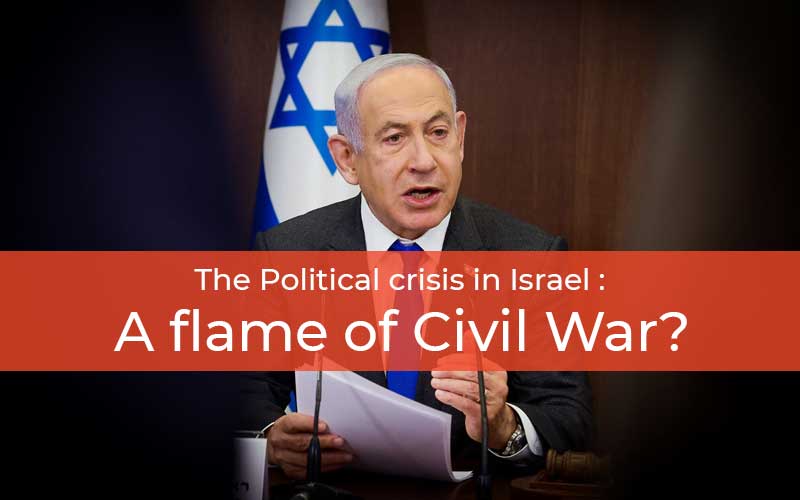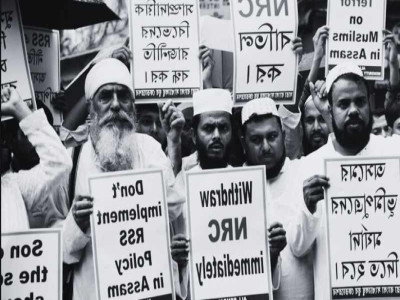
The Political crisis in Israel: A flame of Civil War?
Brief Highlight
Public demonstrations over Israeli Prime Minister Netanyahu's plan for judicial reform have recently rocked Israel. The unrest began when Netanyahu announced a plan to reform the court, having just been re-elected as leader of the coalition dubbed as the most far-right since Israel's independence. Since they would permit the government to pass legislation that cannot be scrutinised by judges, Netanyahu's proposed reforms would effectively undermine the independence of Israel's top court and reduce the authority of the country's judiciary. The protests peaked last week when the nation's defense minister was sacked for opposing Netanyahu's action.
Following the massive protests against the divisive reform, Netanyahu made the announcement that it had been cancelled. However, there are still expectations that the new legislation would be on the agenda for the present Israeli administration in the run-up to the nation's 75th anniversary of independence.
The most recent protests have also sparked concerns about the future of Israel's relations with the United States, a longtime ally, as well as with Russia and Iran in light of recent events in the region.
Is the Political Crisis a flame of civil war?
Today, "civil war" is arguably the phrase used most frequently in Israeli conversation, and it is not merely a figure of speech. It is a manifestation of intense worry that Israelis have never feltbefore, one that is unprecedented and overpowering.
When a nation that takes pride in its internal cohesion to the point that even wars are referred to as ‘brothers’ war’ instead of ‘civil war’, it sounds much more foreboding in Hebrew.
However, for many Israelis, that sentiment of camaraderie has since vanished and been openly replaced by hatred, contempt, and outright dread. What began as "civil disobedience" in opposition to a contentious judicial reform is now growing into something much bigger.
For more than two months, hundreds of thousands of Israelis have taken part in weekly demonstrations and strikes against the judiciary changes, which the administration refers to as "reforms" and opponents as a "coup."
The right-wing, ultranationalist government's proposal could significantly weaken checks and balances on the executive branch and allow the nation to go even closer to totalitarianism.
However, the resentment increases on both sides as the administration refuses to be deterred by the demonstrations.
Politicians, pundits, and even the state's arch-enemies are now sounding the "civil war" alarm.
Latest Developments
There is no room for solace. Israel's democratic institutions are still under attack by Benjamin Netanyahu; it has only been put on hold. The prime minister was compelled to pause his attacks on the judiciary after nearly three months of political unrest, widespread outrage, and escalating demonstrations. By charging recklessly into the independence of the Supreme Court, which was opposed by the majority of Israelis, he has already done enormous harm to the economy and the state. Although he stated that he was "not willing to tear the nation in half," his actions and intent speaks more aboutsaving himself, rather than the nation.
Mr. Netanyahu has little respect for the judicial system and is facing corruption charges. Even the court's minor decisions on banning Israeli settlements infuriate the far-right coalition partners of the prime minister, despite the fact that it has consistently undermined Palestinian rights in the West Bank and contributed to maintaining the occupation.They are not likely to yield. It seems that the best chance that Mr. Netanyahu has is to let the protestors calm down during passover and in the weeks that follow.
Thepolitical incompetence of Mr. Netanyahu has also helped his opponents' tenacity. He didn't present a compelling argument for the improvements. Israel's president, Isaac Herzog, issued a warning that civil war might be on the horizon after his compromising plan collapsed, just weeks before the nation's 75th anniversary. Then, inadvertently, the defence minister, Yoav Gallant, was fired. He had advocated stopping the law due to the uproar it had produced in the military, with reservists declaring they would not serve. More than ten thousand demonstrators flooded the streets. The heads of banks, IT companies, and unions all agreed to a widespread strike. The chief representative of Israel in New York resigned. As a result, all flights were grounded, daycare centers shuttered, and hospitals only treated emergencies.
Final Thoughts
There are concerns among many that the prime minister will only step up his political game rather than scaling down his goals, advancing more slowly and perhaps more successfully as a result. He might abandon his plan to allow the Knesset to overrule the Supreme Court with a simple majority for the time being, but he could move forward with his plans to tighten political control over judicial nominations and restrict the court from having oversight over fundamental laws, both of which have already passed first readings.
Even his most ardent detractors and former allies have learned the hard way that he is a superb political negotiator and survivor. But he has undoubtedly lost strength over the past two weeks. The extreme nature of his alliance implies that he has no one left to collaborate with, and surveys indicate a sharp decline in its popularity. The only way to eliminate this threat to Israel's already meager checks and balances is through persistent pressure. From the unfolding of events, one may concur that Netanyahu won’t be giving up on his quest, but then again, nor will those who are opposing him!
Disclaimer: The opinions expressed in this article are those of the author's. They do not purport to reflect the opinions or views of The Critical Script or its editor.

Newsletter!!!
Subscribe to our weekly Newsletter and stay tuned.

















Related Comments